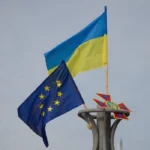A month after the start of the war between Israel and Hamas, the results obtained by American diplomacy are limited, but its supporters and detractors believe that this is partly by design.
“Every country I have spoken to wants us to play a leading role through our diplomacy to try to obtain progress on all aspects of this crisis,” US Secretary of State Antony Blinken said on Monday during his travel to Turkey.
But leaders of the Arab world, and other countries around the world, are calling for a ceasefire, an idea not supported by Washington which is pushing for “humanitarian pauses” while insisting on the right to Israel to defend itself after the bloody Hamas attack on October 7.
According to Israeli authorities, at least 1,400 people died on the Israeli side, mainly civilians killed on the day of the attack by the Palestinian Islamist movement.
In retaliation, Israel relentlessly shelled the Gaza Strip, under Hamas control. These strikes killed more than 10,000 people including 4,000 children, according to a latest report from the Hamas Ministry of Health.
Israeli Prime Minister Benjamin Netanyahu opposing “humanitarian pauses”, Joe Biden raised Monday during a call with him “the possibility of tactical pauses” of the Israeli army to allow the Palestinian civilian population to flee the fighting .
Deterrence
The United States has also negotiated with Israel the reopening of the Rafah crossing point, which connects the besieged Gaza Strip to Egypt, where 400 trucks of humanitarian aid have passed through in two weeks. Knowing that 500 trucks entered the enclave every day before the war.
According to James Jeffrey, a veteran American diplomat and president of the Middle East program at the Wilson Center think tank, Antony Blinken has two objectives in the region: to avoid the widening of the conflict to pro-Iran forces, notably in Lebanon, and to appease the public opinion.
The speech last week by the leader of the pro-Iranian Lebanese Hezbollah, Hassan Nasrallah, who did not sign Lebanon’s full entry into the conflict, was seen by some observers as a way to avoid a confrontation more direct, a positive sign for the Americans.
“I would say Blinken accomplished his goal on this trip,” Mr. Jeffrey said.
The Israeli military response itself constitutes a form of deterrence for Hezbollah and Iran, implying “we will do the same or worse against you” if there is an escalation of conflict.
But Israel’s tactics also complicate America’s second objective.
Blinken wanted to emphasize that “the United States is doing everything to ensure that civilian casualties are spared and is taking the lead in providing humanitarian aid to the residents of Gaza,” according to James Jeffrey.
“But it’s a difficult task because frankly, the Israelis are not as cooperative as they should be,” according to the expert.
“Green light to Israel”
For Palestinian analyst Diana Buttu, it is naive to think that the United States is incapable of making Israel comply with “humanitarian pauses”.
Antony Blinken “is trying to appease Arab countries and the rest of the world while giving the green light to Israel,” according to her.
“To say that the United States does not have a say on the billions of dollars it gives is to minimize the role of Washington,” pointed out Ms. Buttu.
Israel’s primary supporter, the United States has always been criticized by the Arab world but this is not something that American leaders see as irreversible, explained Jon Alterman, expert on the region at the think tank. Center for Strategic and International Studies.
With its offensive against Hamas, Israel “is increasingly distancing itself from its neighbors, and from the rest of the world, but Washington is trying very hard to reduce this gap”, according to him.
“It’s typical of diplomacy. It always takes longer and is more partial than we would like,” he continued.
This article is originally published on arabnews.fr






